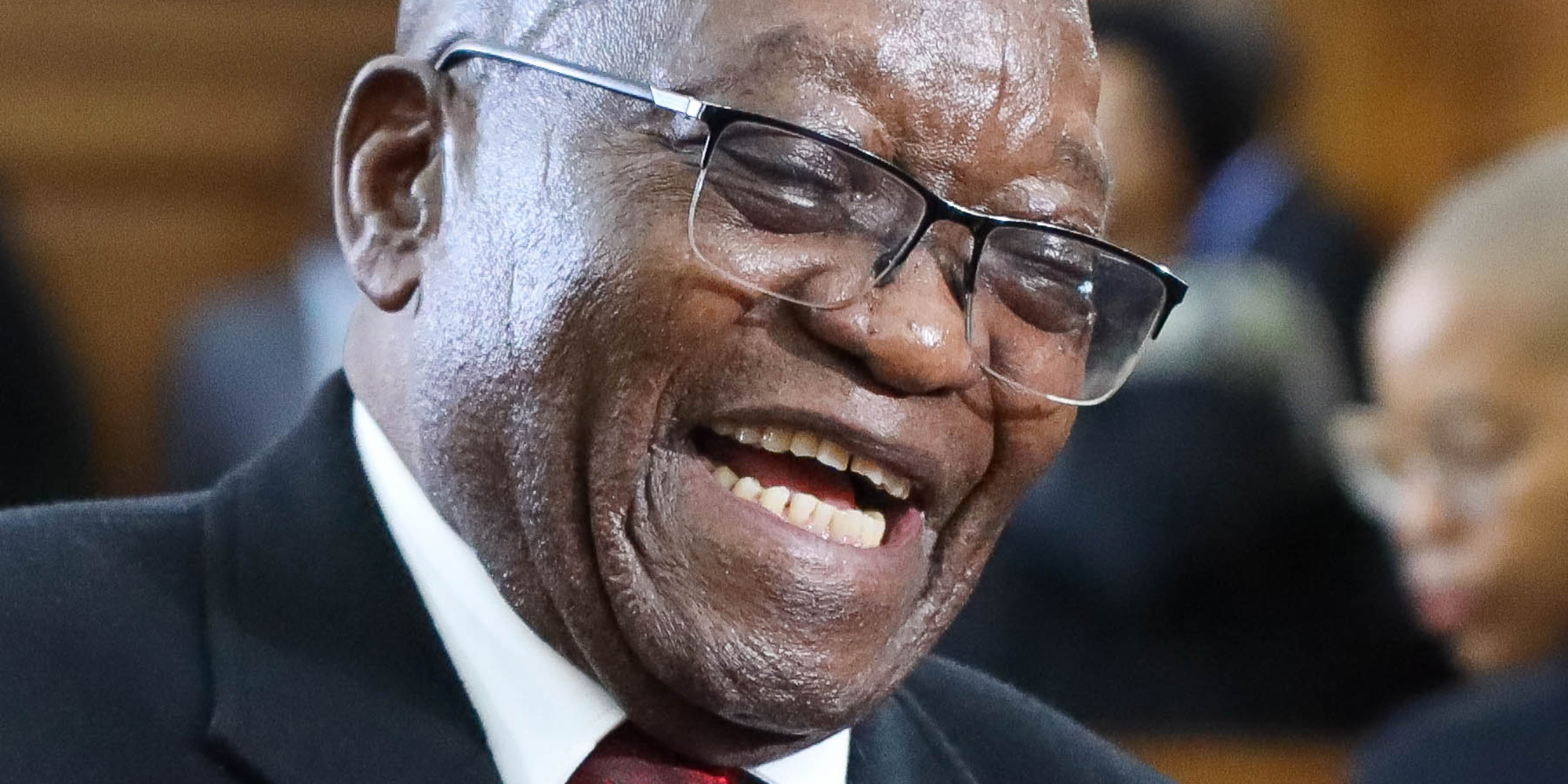In terms of Section 84(2)(j) of the South African Constitution, the president – acting as the head of state – is “responsible for pardoning or reprieving offenders and remitting any fines, penalties or forfeitures”. President Cyril Ramaphosa relied on this provision (mirrored in Section 82 of the Correctional Services Act) to order a 12-month reduction of the sentences of all prisoners not serving time for certain categories of serious or violent crime. He granted low-risk offenders an additional 12-month remission of their sentences.
For low-risk offenders like Mr Zuma, who had less than 24 months of their sentence remaining, the remission in effect “extinguished” the remaining part of their sentence. As a result, Mr Zuma no longer had any prison sentence to serve, and was therefore a free man. Even if he had wanted to, there was nothing the Commissioner of Correctional Services could have done to ensure that he served out the required part of his original sentence. (His decision to fast-track the processing of Mr Zuma’s remission is legally a different matter.)
Informed critics of this turn of events would argue that it is not a coincidence that President Ramaphosa’s decision to remit the sentences of certain categories of prisoners, which will result in the release from prison of approximately 9,500 inmates, resulted in Mr Zuma not having to go back to prison. They might argue that the “real” purpose of (or the motive behind) the remission was not to reduce overcrowding in prisons (as Mr Ramaphosa claimed), but to ensure that Mr Zuma did not have to go back to prison.
While this may well all be true, it does not mean the decision was unconstitutional. Nor is it that clear that it demonstrates contempt for the rule of law and the principle of equality before the law – as some critics believe. To explain why this is so, it is necessary to take a closer look at the nature and scope of the powers bestowed on the president by Section 84(2)(j) of the Constitution.
Roots in absolute monarchy
The power of heads of state to pardon and reprieve offenders and remit their sentences can be found in a large number of the constitutions of constitutional democracies across the world. As Andrew Novak explains in his book Comparative Executive Clemency: The Constitutional Pardon Power and the Prerogative of Mercy in Global Perspective, this power has its roots in absolute monarchy, and it is therefore odd that so many democracies continue to allow the head of state to interfere in the justice system, to overturn criminal convictions (through pardon) and to suspend (through reprieve) or to reduce (through remittance) the punishment imposed by a sentencing court, thus blurring the separation of powers between the executive and the judiciary.
This power is also open to abuse – especially, as is the case in South Africa, where no or few restrictions are placed on the purposes for which it can be used. An infamous example from the United States is the pardoning of Richard Nixon by President Gerald Ford after the Watergate scandal. A more recent example is former President Donald Trump’s granting of clemency to several unsavoury characters, including former campaign staff members and political advisers such as Paul Manafort, Roger Stone, Michael Flynn and Stephen Bannon.
The power is also difficult to reconcile with the principle that everybody is equal before the law, as it will often – and sometimes quite randomly – benefit some offenders over others. This is especially true in cases where the president pardons or reprieves, or remits the sentence, of an individual offender.
But proponents of the retention of this power argue that it remains valuable because it allows justice to be tempered by mercy, a powerful argument in contexts where the harsh or unequal application of the law causes severe injustice. The most obvious example would be a situation where the power is used to commute the death sentence imposed on an individual whose guilt may be in doubt. (Because it is cruel, inhuman, and degrading, my view is that any commutation of the death sentence – no matter how heinous the crime – should be applauded.)
It is striking that Section 84(2)(j) of the South African Constitution grants a broad, seemingly unfettered, power to the president to pardon or reprieve offenders or remit their sentences. The section thus allows the president to exercise this power for a wide range of good or bad reasons.
The exercise of this power is nevertheless subject to judicial review in terms of the principle of legality, but because the discretion bestowed by it is so wide, courts will seldom be able to invalidate decisions made in terms of the provision. The courts will have to ask if the power was exercised for a legitimate purpose, thus a purpose permitted by section 84(2)(j) of the Constitution.
Additionally, the manner in which the decision to pardon or reprieve offenders or remit their sentences was made, as well as the decision itself, must be rationally related to the purpose sought to be achieved by the decision.
But as the Constitutional Court suggested in President of the Republic of South Africa and Another v Hugo, such reviews would seldom be successful. The majority specifically noted that “where the president pardons or reprieves a single prisoner … it is difficult to conceive of a case where a constitutional attack could be mounted against such an exercise of the presidential power”. This is so because the power may be exercised to achieve any purpose that it would normally be legitimate for a democratic state to pursue.
However, in Hugo the court did note that were the president to “abuse his or her powers by acting in bad faith”, for example by granting a “pardon in consideration for a bribe”, the court would be able to review and set aside the decision. The same is true if the president “were to misconstrue his or her powers”.
Difficult to argue against remittance decision
In light of the above, it would be difficult to argue that Mr Ramaphosa’s remittance decision was unconstitutional and invalid. Presidents Mandela, Mbeki (twice) and Zuma all remitted the sentences of tens of thousands of inmates during their terms as president, while this is the third time that President Ramaphosa has ordered such a remission. Had Mr Zuma not been in the mix, no one would have argued that the latest decision was irrational or made to pursue an ulterior purpose, and that it was therefore invalid.
Even if we assume that the sole purpose of the latest remission was to ensure that Mr Zuma did not have to go back to jail, it would still in all likelihood be held to be rational and constitutionally valid. This is so because Section 84(2)(j) permits the president to use this power to achieve any number of aims that a democratic state may legitimately pursue. It would have been perfectly valid for the president to remit only Mr Zuma’s sentence because he felt sorry for Mr Zuma and wanted to show mercy, or to acknowledge Mr Zuma’s contribution to the freedom Struggle, or to prevent the type of large-scale rioting that followed his previous bout of incarceration, to name but a few.
Unless the process followed to reach the remission decision was tainted by irrationality, I would be very surprised if any court found that the decision was made for an ulterior purpose or in bad faith and was thus invalid, as this would probably require it to find that Section 84(2)(j) constrains the president in ways that the section clearly does not.
The position would have been different, of course, if the president had used this power in a corrupt manner (for example, by granting a pardon or remission to an individual in exchange for money or some other personal or political benefit), or if he had exercised the power for his own personal benefit (for example, by granting a pardon to a prisoner to ensure that the pardoned individual does not testify against him in a criminal trial).
It may sometimes be difficult to distinguish between a decision that pursues a permissible purpose and one that pursues an ulterior purpose. I am not sure, for example, whether it would be permissible for a South African president to grant the types of clemencies that Donald Trump granted to his campaign staff, because this may or may not have been done to secure their loyalty to Trump in anticipation of his future legal battles. But a decision by a president to exercise this power for pragmatic reasons would not come close.
The decision to grant a general remission for certain categories of prisoners to ensure Mr Zuma would not have to return was evidently a pragmatic and not a principled one. One could argue that it was unwise, cynical, and politically expedient. But in the circumstances, it was also the least damaging way to defuse the very real practical difficulties presented by Mr Zuma’s serial constitutional delinquency.
When the president grants pardons or reprieves offenders or remits their sentences, it is less problematic from a rule of law perspective when this is not done on an individual basis, but on the basis of a set of clearly defined objective criteria, as this reduces the inherent arbitrariness of such decisions. I would therefore argue that the decision to grant a general remission instead of remitting or pardoning only Mr Zuma was by far the least bad option available to resolve the problem pragmatically.
Unlike the earlier unlawful granting of medical parole based on false claims about Mr Zuma’s health, the president’s decision arguably signals respect (instead of contempt) for the law, by (at least formally) treating Mr Zuma as just one of the many convicted criminals who will benefit from the remission. The decision to fast-track the processing of his remission is, of course, a different story.
There are valid reasons to be angry that Mr Zuma will not be required to serve the minimum part of the sentence imposed on him. There are also valid arguments to be made that a more principled and less pragmatic approach should have been followed.
But it would be better to avoid making emotional and overblown claims based on a misunderstanding of the nature of the power contained in Section 84(2)(j) of the Constitution.
It may or may not have been a bad decision. But a full frontal attack on the rule of law? Hardly. DM





